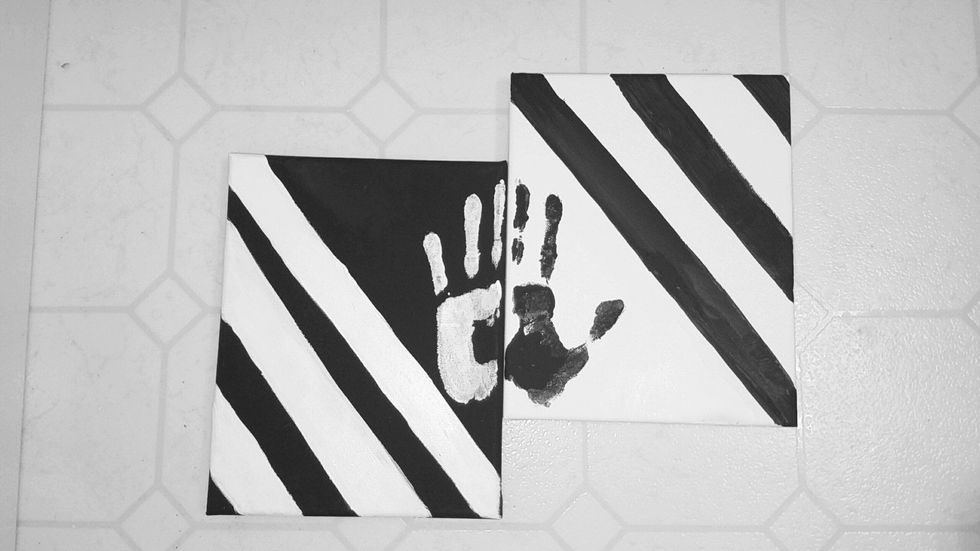For years, I'd never been able to understand my disturbing impulsivities and mood swings. It seemed like no matter if things were going well, I'd still be the same... kind of.
Eventually, I was diagnosed with borderline personality disorder. A lot of people ask me what the illness is and how it feels to live with such a disease. Recently, the artist I am, generated the best possible way of describing what borderline is, from my own perspective. Here's how I phrase it: Sometimes I'm white with black stripes; sometimes I'm black with white stripes. I know that doesn't make sense without further description. So, I made a painting to lay it all out.
For starters, I chose black and white because borderline patients are described as having "black and white" thinking patterns. What this means is that borderline patients see things as, "I love you," or "I hate you." No gray area.
I used two canvases. One with a black base color, and the other, a white base color. When an artist starts a painting, s/he will select a base color, the foundation to a painting. In my case, that's either black (which I've chosen to represent sadness) or white (happiness). After the artist paints the base color, s/he will begin painting an image over top.
The stripes I layered are to represent mood swings I have throughout each day, whether or not I'm in a brief period of overall blackness or whiteness. What I mean by that is, I will be moody all day every day. I will have both, thoughts of suicide, and ecstatic spikes of energy multiple times in one day. No matter how I feel in general, which, as I've described, can either be black or white -- depressed or not depressed. My base color usually lasts about three months, if that.
Another common thing among borderline patients is frequent changes in identity, which brings us to the handprint. Many borderline patients quickly and abruptly change their career goals, relationships, and morals without willpower. Sometimes I want to be an actress. In the same day, I'll want to be a linguist. Personal relationships are hard for me because my views of the people I love most can harshly fluctuate from severe levels of admiration to extreme levels of hatred and devaluation for no apparent reason. Some days, I'll dedicate myself to becoming a better person and really want to change the way I treat loved ones and myself. I'll start attending church more and start praying more. But it never takes long for me to change my mind and start researching ways to commit suicide instead. Trying to control these impulses is like playing tug-of-war with myself. I have little to no idea who I truly am. This is also why I chose to make the handprints in halves on each canvas.
There you have it. Sometimes I'm white with black stripes and sometimes I'm black with white stripes. The painting I made captures almost every aspect of what it means to have borderline personality disorder from my perspective.
“People with BPD are like people with third degree burns over 90% of their bodies. Lacking emotional skin, they feel agony at the slightest touch or movement.”
― Marsha M. Linehan
“I couldn’t trust my own emotions. Which emotional reactions were justified, if any? And which ones were tainted by the mental illness of BPD? I found myself fiercely guarding and limiting my emotional reactions, chastising myself for possible distortions and motivations. People who had known me years ago would barely recognize me now. I had become quiet and withdrawn in social settings, no longer the life of the party. After all, how could I know if my boisterous humor were spontaneous or just a borderline desire to be the center of attention? I could no longer trust any of my heart felt beliefs and opinions on politics, religion, or life. The debate queen had withered. I found myself looking at every single side of an issue unable to come to any conclusions for fear they might be tainted. My lifelong ability to be assertive had turned into a constant state of passivity.”
― Rachel Reiland, Get Me Out of Here: My Recovery from Borderline Personality Disorder
"You know you're borderline when you fluctuate between fearing abandonment and encouraging it."
― Jaen Wirefly






 mr and mrs potato head
StableDiffusion
mr and mrs potato head
StableDiffusion










